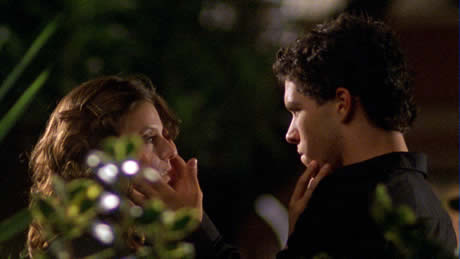 “Death should not be hard to those who have their hearts at ease. It does not matter if there is nothing beyond this life. At least, to die is to forget. Do not miss life; do not, even if reason tells you that you could have been happy if you hadn’t met me on the path where I have led you to your death…”
“Death should not be hard to those who have their hearts at ease. It does not matter if there is nothing beyond this life. At least, to die is to forget. Do not miss life; do not, even if reason tells you that you could have been happy if you hadn’t met me on the path where I have led you to your death…”
(Simão, in Doomed Love, by Camilo Castelo Branco)
After the successful The Miracle According to Salomé, one of the films that established the awakening of a new era in the Portuguese filmmaking, it’s time for Mário Barroso – once cinematographer of Manoel de Oliveira and João César Monteiro – to present his second feature film in theaters, Doomed Love. One of the most highly anticipated Portuguese films of the year; it is written and freely inspired by the homonymous Camilean novel, which stands as the maximum exponent of Romantic Portuguese literature. Carlos Saboga, who already collaborated with Barroso in his previous project works with him again on this film. In a distinct space/time location the path of events is drawn by parallel and similar situations read, written, performed, and watched as experienced- replete with religious iconography and romantic references, a semiologic compound.
Religious Catholic inserts are always present and praised, from the veiled presentation of Teresa, as an apparition of the Virgin Mary, unattainable, fragile, and succumbing to starvation, pictured on Simão’s bedroom wall like an illuminated saint. On that same wall you can see written over and over “submission is an ignominy”. “He used to be thin as a praying mantis”, Teresa said. She stole his image, became his icon, and like in many religious wars, all their little efforts were useless after all. They would call for blood, for the extinction of vitality, for the blood of Christ, that redemptionist instrument that in all religions and eras links men and God by common blood, and its power would always take them apart from each other. This 4th adaptation of the novel is more than a bourgeois backgrounded Camilean or even a Shakespearean inspired conflictuous love story between two characters; it’s a story of destruction, the destruction of an hero, Simão Botelho, compared by the director and cinematographer to Adele H, Victor Hugo’s daughter, Iraqi kamikazes, to Jim Morrison, Sid Vicious or Kurt Cobain, just as brilliantly unbalanced as them. And there’s where “our” cursed love lies, in that childish teenager; his inflexible narcissistic solitude, suicidarian ravaging self destruction attracts “like a fatal aura, a dark light, most of the persons who cross his way”.
backgrounded Camilean or even a Shakespearean inspired conflictuous love story between two characters; it’s a story of destruction, the destruction of an hero, Simão Botelho, compared by the director and cinematographer to Adele H, Victor Hugo’s daughter, Iraqi kamikazes, to Jim Morrison, Sid Vicious or Kurt Cobain, just as brilliantly unbalanced as them. And there’s where “our” cursed love lies, in that childish teenager; his inflexible narcissistic solitude, suicidarian ravaging self destruction attracts “like a fatal aura, a dark light, most of the persons who cross his way”.
“Do you believe in eternal life?” – Mariana reading her notebook reports Teresa’s anxieties to Simão. As she asks him, nature mutates to show its colors and makes us wonder about the plausibility of our intimate doubts. The same pool where Rita, his little sister and confidant, used to swim and float while the sun drowned in that water, is now covered with leaves and petals. Summer soon became autumn and has Simão’s rage ceased to exist? His blood, once so bright, became darker, there on his once so blank, now vividly contrasting sheets. It’s winter snow and there he stands beneath his bed, his body lying so cold and dead.
Though the lack of intensity control in some scenes is quite obvious, and consequently confers an excessive theatricality comparative to the apparently planned and desired and are as notorious as those which purposefully shock the audience, the general balance reveals to be light and, once more, surprisingly refreshing. According to previous and constant errors and absences found in most of Portuguese film productions, only a coherent character presentation and methodic sound engineering could achieve a safer effect. Signing the music score, so well melted in the flow, Bernardo Sassetti reveals himself as one of the major responsibilities of such accomplishment. And in spite of Portugal still being in need of a much better acting school, it’s remarkable to be aware of such a gifted young actress as Catarina Wallenstein.
 With its international premiere last Wednesday at Locarno Film Festival International Competition in Switzerland, the film received, according to Barroso in a conference right after its presentation in a crowded auditorium, “extremely positive” reactions. The results of the festival will be announced this Saturday.
With its international premiere last Wednesday at Locarno Film Festival International Competition in Switzerland, the film received, according to Barroso in a conference right after its presentation in a crowded auditorium, “extremely positive” reactions. The results of the festival will be announced this Saturday.
Original Title: Um Amor de Perdição
International Title: Doomed Love
Director: Mário Barroso
Writer: Carlos Saboga (adaptated screenplay)
Producer: Paulo Branco (Clap Filmes)
Language: Portuguese
Release Date: 11 August 2008

